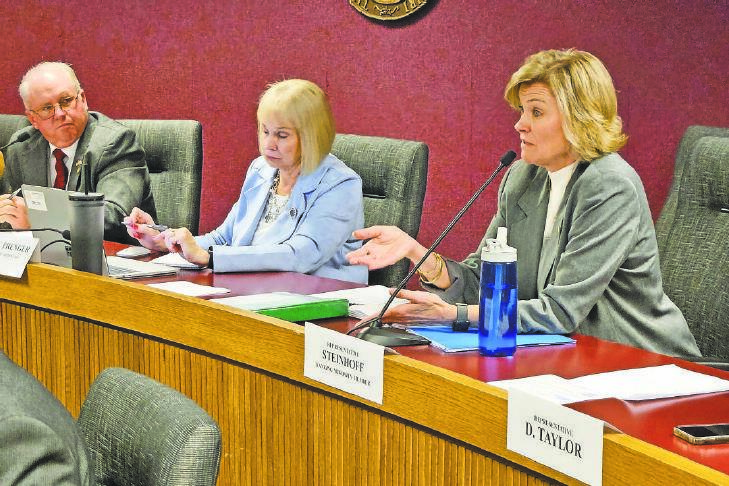Engineers: New subdivision would help with flooding
TROY – A proposed subdivision on the west side of Troy would reduce stormwater runoff by about half to an adjacent subdivision frequently besieged with flash flooding, according to preliminary engineering studies.
Monte Cannon, owner of Cannon Realty, met with Troy’s Board of Aldermen in a workshop meeting last week to discuss the details of the proposed 101-home Whiskey Creek subdivision.
(Editor’s Note: Click here to read a related story about how this meeting became highly contentious when the public was denied the opportunity to speak.)
Troy City Administrator James Knowles opened the meeting with a slideshow presentation outlying the particulars of the subdivision, which will be located on a 46-acre piece of land adjacent to The West Hamptons subdivision.
At it’s August meeting, the board tabled a decision on the preliminary plat for the subdivision due to concerns over stormwater runoff.
But according to engineering studies provided by Cannon, the subdivision will actually decrease the amount of runoff going into Buchanan Creek which runs along the West Hamptons, instead of increasing it.
“Currently, you’ve got 33 cubic feet per second of water coming off that property into Buchanan Creek. We know that after the basin’s constructed, it’s going to go down to 17.6 cubic feet per second,” Knowles said. “So … if these calculations are correct, which we seem to believe that they are, this should help in some way slow the amount of water going into Buchanan Creek during these storms.”
Alderman Dennis Detert, who lives in the West Hamptons and has witnessed the flash flooding from Buchanan Creek firsthand, expressed skepticism regarding engineers’ promises.
“We took the advice of the engineer and it bit us in the butt,” he said. “That’s why I stress to the board, more so today than ever, to vote your conscience on anything and to really pay attention to everything that goes on. Because, like I said, we vote on some of the things we’re not totally informed on.”
Knowles and Detert agreed part of the problem with the West Hamptons is an equally poorly-designed and maintained detention basin. He assured the board that wouldn’t happen with this subdivision.
“Our process states before the final plat, they’re going to have to provide us … a maintenance agreement … that says it must be maintained as a detention basin in perpetuity,” Knowles said. “That the HOA …will be in charge of maintaining this going forward. That detention basin will be permitted through the city and inspected on a triennial basis.”
Knowles stressed the flooding problems in The West Hamptons is one of the reasons for that requirement.
“One of the problems we’ve had in previous developments is even when we have a detention basin, we’ve had no such agreement,” he said. “That is not the case in our process going forward. There will be no final plat dedication without those things. So he can’t sell a house until I get that.”
Cannon also spoke to the board and expressed his frustration with meeting all of the city’s requirements for construction, but still not receiving approval.
“The city has requirements we have to meet when we design subdivisions. This subdivision has met the requirements. We have exceeded the requirements,” he said. “I don’t know where the problem is with saying that this subdivision is okay. Now if you don’t like the criteria, change the criteria. I don’t know how else to do it.”
Knowles echoed those sentiments.
“It (the land) is zoned for this. It meets the requirements. If we want to change those things, we want to have less density … you want to have less homes, you want to have less streets, we have to change all of our codes,” Knowles said. “If we don’t like this, we need to change that and we have to do that before somebody comes in and drops $1 million on 46 acres. That becomes legally problematic.”
Mayor Ron Sconce said the board is essentially punishing Cannon for the crimes of other developers.
“We’re just going to cut it (runoff) down from almost 34 to 17. That’s a significant improvement,” he said. “It’s not right to hold one developer hostage.”
Detert agreed with Sconce and seemingly apologized to Cannon for the delay.
“It’s sad, it’s not your fault,” Detert said to Cannon. “It’s unfortunate what’s taken place so far. Please don’t take it personally, and I understand why you do. I guess it’s just bad timing. But I really do believe it’s going to be a good development.”
Alderman Rachel Dunard said she’d be able to approve the plans once she receives confirmation of the runoff numbers from an independent engineer. She added without that independent confirmation, the workshop meeting was a waste of time.
“We are just trying to do our due diligence,” she said. “I don’t know why we had a workshop prior to having a second opinion.”
Knowles said the city is in the process of hiring an engineer to review the proposal and the board should be able to select one at its Sept. 15 meeting.
However, he also said its unlikely that engineer contradicts Cannon’s enough to derail the project.
“So the outside engineer would have to come back and say, essentially, they don’t meet the standard,” Knowles said. “Right now, they far exceed the standard. So, that’s a pretty-high threshold.”
Knowles also reminded the board approving the preliminary plat is one of the more routine steps for a new subdivision that typically doesn’t receive this level of scrutiny.
“We have provided you more information than our ordinances require,” Knowles said, reminding the board there were other stages requiring board approval. “Preliminary plat does not require construction plans, detention (basins), all of that at this level. It’s a general location of where these items would go, not until construction phase where the capacity, all of that stuff is really scrutinized and all of it’s finalized. The HOA professional maintenance, the dedication, all of that will be done in the final plat stage.”
And even before the meeting became more contentious regarding the public’s inability to address the board, Knowles admitted the workshop may not have been as successful as he hoped.
“We’ve given you a little bit more information because it’s obviously a hot topic, in which … I wanted to try to allay those fears up front,” he said. “Unfortunately, I think maybe all it’s done is create more fears up front versus allowing us to move forward with this preliminary approval.”


